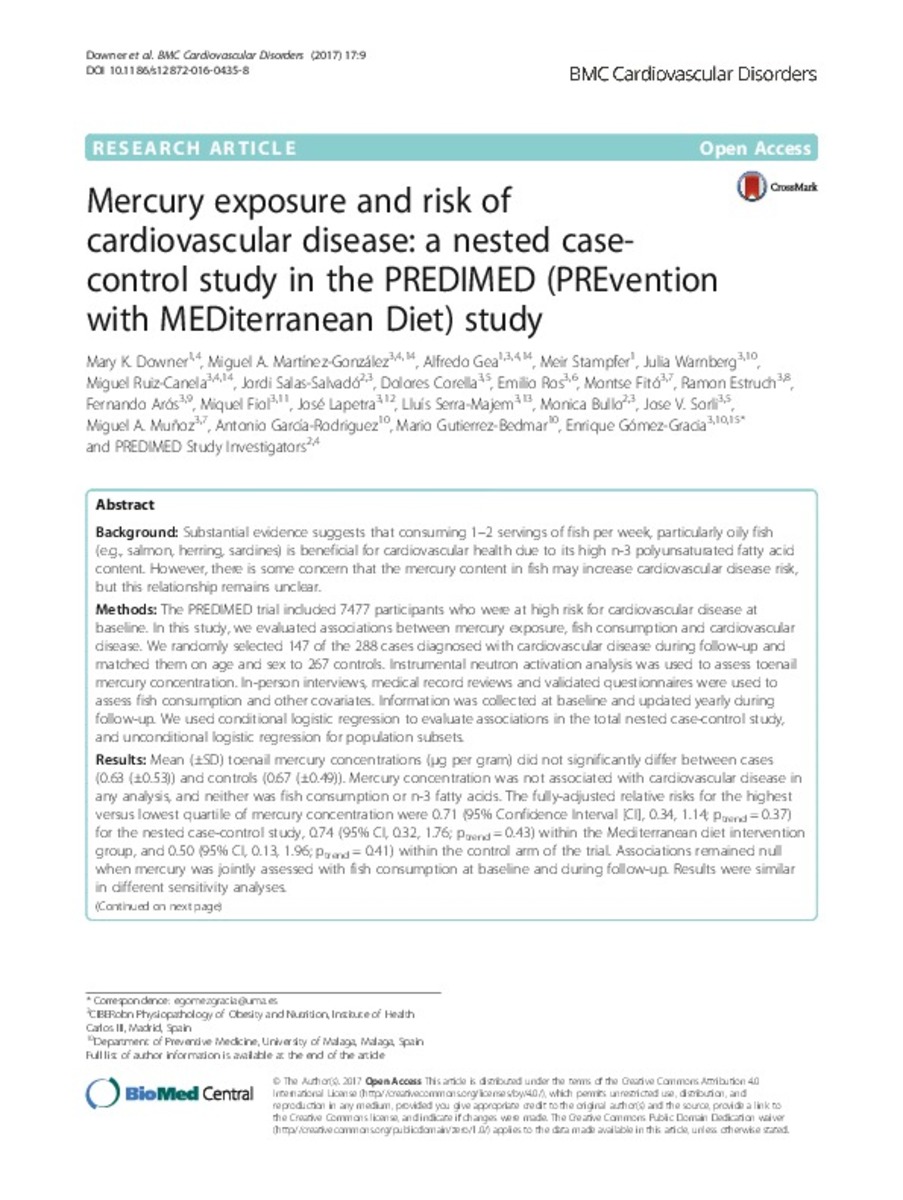Full metadata record
| DC Field | Value | Language |
|---|---|---|
| dc.creator | Gomez-Gracia, E. (Enrique) | - |
| dc.creator | Gutierrez-Bedmar, M. (Mario) | - |
| dc.creator | Garcia-Rodriguez, A. (Antonio) | - |
| dc.creator | Muñoz, M.A. (Miguel Angel) | - |
| dc.creator | Sorli, J.V. (Jose V.) | - |
| dc.creator | Bullo, M. (Monica) | - |
| dc.creator | Serra-Majem, L. (Luis) | - |
| dc.creator | Lapetra, J. (José) | - |
| dc.creator | Fiol, M. (Miquel) | - |
| dc.creator | Aros, F. (Fernando) | - |
| dc.creator | Estruch, R. (Ramón) | - |
| dc.creator | Fito, M. (Montserrat) | - |
| dc.creator | Ros, E. (Emilio) | - |
| dc.creator | Corella, D. (Dolores) | - |
| dc.creator | Salas-Salvado, J. (Jordi) | - |
| dc.creator | Ruiz-Canela, M. (Miguel) | - |
| dc.creator | Wärnberg, J. (Julia) | - |
| dc.creator | Stampfer, M. (Meir) | - |
| dc.creator | Gea, A. (Alfredo) | - |
| dc.creator | Downer, M.K. (Mary Kathryn) | - |
| dc.creator | Martinez-Gonzalez, M.A. (Miguel Ángel) | - |
| dc.date.accessioned | 2017-03-28T11:55:30Z | - |
| dc.date.available | 2017-03-28T11:55:30Z | - |
| dc.date.issued | 2017 | - |
| dc.identifier.citation | Downer MK, Martínez-González MA, Gea A, Stampfer M, Wärnberg J, Ruiz-Canela M, et al. Mercury exposure and risk of cardiovascular disease: a nested case-control study in the PREDIMED (PREvention with MEDiterranean Diet) study. BMC Cardiovascular Disorders. 2017 Jan;17:9. | es_ES |
| dc.identifier.issn | 1471-2261 | - |
| dc.identifier.uri | https://hdl.handle.net/10171/43148 | - |
| dc.description.abstract | Background: Substantial evidence suggests that consuming 1–2 servings of fish per week, particularly oily fish (e.g., salmon, herring, sardines) is beneficial for cardiovascular health due to its high n-3 polyunsaturated fatty acid content. However, there is some concern that the mercury content in fish may increase cardiovascular disease risk, but this relationship remains unclear. Methods: The PREDIMED trial included 7477 participants who were at high risk for cardiovascular disease at baseline. In this study, we evaluated associations between mercury exposure, fish consumption and cardiovascular disease. We randomly selected 147 of the 288 cases diagnosed with cardiovascular disease during follow-up and matched them on age and sex to 267 controls. Instrumental neutron activation analysis was used to assess toenail mercury concentration. In-person interviews, medical record reviews and validated questionnaires were used to assess fish consumption and other covariates. Information was collected at baseline and updated yearly during follow-up. We used conditional logistic regression to evaluate associations in the total nested case-control study, and unconditional logistic regression for population subsets. Results: Mean (±SD) toenail mercury concentrations (μg per gram) did not significantly differ between cases (0.63 (±0.53)) and controls (0.67 (±0.49)). Mercury concentration was not associated with cardiovascular disease in any analysis, and neither was fish consumption or n-3 fatty acids. The fully-adjusted relative risks for the highest versus lowest quartile of mercury concentration were 0.71 (95% Confidence Interval [CI], 0.34, 1.14; ptrend = 0.37) for the nested case-control study, 0.74 (95% CI, 0.32, 1.76; ptrend = 0.43) within the Mediterranean diet intervention group, and 0.50 (95% CI, 0.13, 1.96; ptrend = 0.41) within the control arm of the trial. Associations remained null when mercury was jointly assessed with fish consumption at baseline and during follow-up. Results were similar in different sensitivity analyses.Conclusions: We found no evidence that mercury exposure from regular fish consumption increases cardiovascular disease risk in a population of Spanish adults with high cardiovascular disease risk and high fish consumption. This implies that the mercury content in fish does not detract from the already established cardiovascular benefits of fish consumption. | es_ES |
| dc.language.iso | eng | es_ES |
| dc.publisher | Bio Med Central | es_ES |
| dc.rights | info:eu-repo/semantics/openAccess | es_ES |
| dc.subject | Toenail biomarker | es_ES |
| dc.subject | PREDIMED | es_ES |
| dc.subject | Mediterranean diet | es_ES |
| dc.subject | Cardiovascular disease | es_ES |
| dc.subject | Fish | es_ES |
| dc.subject | Mercury | es_ES |
| dc.subject | Materias Investigacion::Ciencias de la Salud::Salud pública | es_ES |
| dc.title | Mercury exposure and risk of cardiovascular disease: a nested casecontrol study in the PREDIMED (PREvention with MEDiterranean Diet) study | es_ES |
| dc.type | info:eu-repo/semantics/article | es_ES |
| dc.description.note | This article is distributed under the terms of the Creative Commons Attribution 4.0 International License (http://creativecommons.org/licenses/by/4.0/), which permits unrestricted use, distribution, and reproduction in any medium, provided you give appropriate credit to the original author(s) and the source, provide a link to the Creative Commons license, and indicate if changes were made. | es_ES |
| dc.identifier.doi | http://dx.doi.org/10.1186/s12872-016-0435-8 | es_ES |
Files in This Item:
Statistics and impact
Items in Dadun are protected by copyright, with all rights reserved, unless otherwise indicated.






